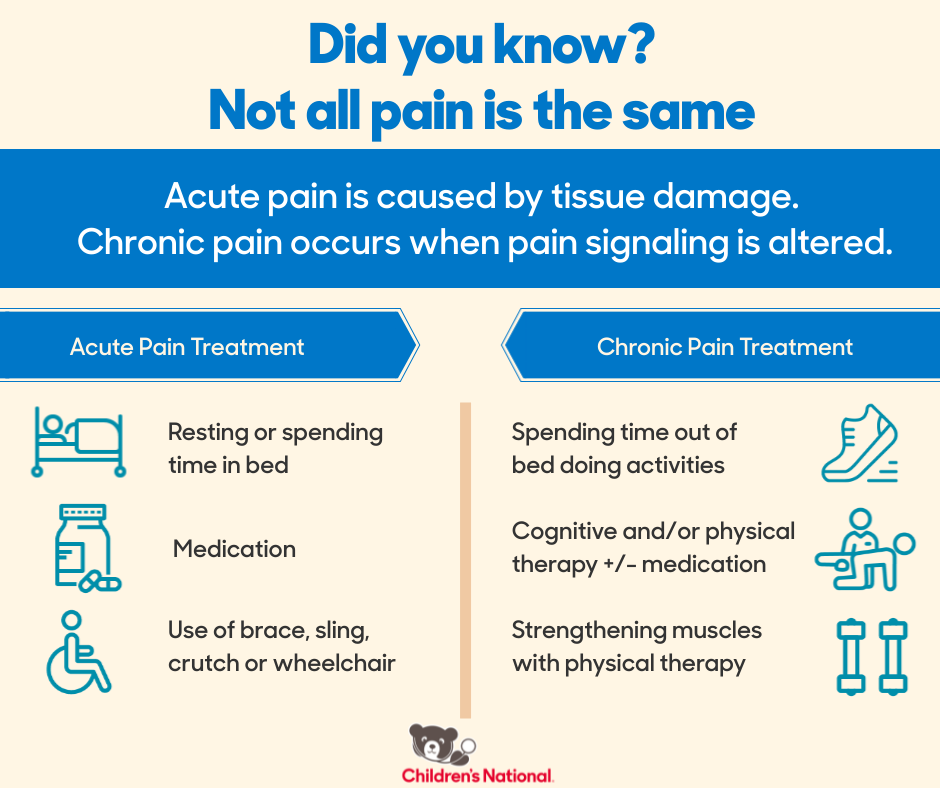“Tylenol and Ibuprofen did not work; we do not know what to do.”
“My child has rested, her tests are normal but her pain is worse, what is wrong?”
Have you ever uttered those words? You are not alone.
When most of us think of pain, we think of a fever or a joint sprain — pain caused by inflammation for which Tylenol and ibuprofen may help. But what if the pain is not caused by inflammation?
Chronic pain is pain that is not driven by organ or tissue damage. It is driven by altered signaling within the nervous system which is not picked up through labs or imaging. It is common to have normal labs and imaging in the setting of chronic pain. It often does not respond to over the counter pain medication. Medication alone does not help. It requires different types of therapy for treatment.
The words “acute” and “chronic” may make you think that chronic pain is just a continuation of acute pain but this is not true. Acute pain is caused by tissue damage. Chronic pain is when the pain signaling itself is altered. Acute and chronic pain are completely different!
Many people apply acute pain strategies for chronic pain and find chronic pain worsening.
Pairing the right type of therapy with the type of pain is necessary for treatment.
| Acute pain treatment strategy |
Chronic pain treatment strategy |
| Rest/spending time in bed |
Activity/spending time out of bed |
| Medication based |
Use of cognitive, physical therapy; +/-medications |
| Use of brace, sling, crutch, or wheelchair |
Strengthening muscles through physical therapy so no assist device is needed |
Sometimes the lines between acute and chronic pain are blurred. For example, an injury causes acute pain but if pain is still felt after the tissue has healed, chronic pain has developed.
For this reason, if you have concerns about your child and pain, please seek a pediatric pain specialist near you. All pain is not all the same.
How much do you know about pain and pediatric pain medicine? Take our pain quiz and find out!

 https://riseandshine.childrensnational.org/wp-content/uploads/2017/09/kids-running-with-backpacks.jpg
300
400
Rise and Shine
https://riseandshine.childrensnational.org/wp-content/uploads/2017/11/childrens_riseandshine_logo.jpg
Rise and Shine2023-08-25 14:00:492025-09-15 12:28:04Avoiding backpack back pain
https://riseandshine.childrensnational.org/wp-content/uploads/2017/09/kids-running-with-backpacks.jpg
300
400
Rise and Shine
https://riseandshine.childrensnational.org/wp-content/uploads/2017/11/childrens_riseandshine_logo.jpg
Rise and Shine2023-08-25 14:00:492025-09-15 12:28:04Avoiding backpack back pain



 Elisha Peterson, MD, FAAP, is a board certified pediatric anesthesiologist and pain medicine physician.
Elisha Peterson, MD, FAAP, is a board certified pediatric anesthesiologist and pain medicine physician.












Leave a Comment
Want to join the discussion?Feel free to contribute!